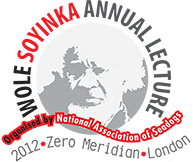On Saturday 14 July 2012, the 15th Annual Professor Wole Soyinka Lecture series took place at the London South Bank University.
Three distinguished speakers, Dr Ibibia Worika (Legal Counsel, Commonwealth Secretariat, London), Dr Grimot Nane (Economist, London Southbank University) and Barr. Uche Anyawu (Convener, Citizens Initiative for Responsible Leadership, Abuja) addressed the audience gathered at the venue on the theme of the day a “clarion call” , by the Nobel Laureate, for a “new generation of freedom and anti-corruption fighters.”
The lecture was followed by a very vibrant interactive session by the audience and the following resolution emerged from the discussion.
- That we should retrace our roots and allow our cultural and moral values that we have long since abandoned to be allowed back to the fore.
- Violent revolution “Rawlings Style” was discarded as an option on the basis that history taught us that in the early 1960s in Nigeria some young military officers had the same notion to cleanse the system of corruption. However, the revolution that initially claimed the lives of some leaders was deemed a lop-sided one, that eventually led to civil war, failed to achieve its aim and only resulted into an orgy of violence and blood letting.
- The discussants and contributors to the event were adamant that their voices should be heard by the powers that be, stressing that it is not the case for individual freedom and anti-corruption fighters but a question of forming organisations and strengthening of institutions such as the judiciary to combat corruption.
- That individuals should be encouraged to participate in the fight against corruption by changing themselves through refusing to accept or offer bribe, join together with like minds to achieve this aim.
- Moreover, proliferation of organisations all fighting corruption should be discouraged and that there should be an amalgamation of organisations under the same umbrella. These organisations should organise “Ali-must-go” style of nation-wide demonstrations to ensure that the government listens to the people.
- One of the themes that persisted during the course of the event was that we must change our mindset as a starting point and join the political system to contest in elections. When good people abandon the political scene for the bad eggs there will be no change. The rot will continue within the system.
- There was the need for (morally) “strong” men and women to stand up and be counted and participate in the political system, as it is not possible to “sweep a dirty room from the outside
- The press must itself bee seen not to be corrupt and reliant on hand-outs from corrupt politicians to sustain itself whereby acting as image sanitising conduits. Rather, a vibrant press that plays a vital role in exposing and combating corruption.
- Education of the masses on the evil of corruption should commence in earnest. Civic studies as to what it involves to be good citizens devoid of corruption should be introduced to the school curriculum as a new method of grooming youngsters, as it was noted that corruption has now pervaded the fabric of society.
- Finally, the discussants identified the power of Social media and Internet as an essential tool to be deplored in order to sensitise the masses, expose corruption wherever it may be in order to fight it, to organise civil protest, to promote good governance and ensure that the voices of the masses are heard by the government.



![[PRESS RELEASE] AFFIRMATION OF EMERGENCY RULE IN RIVERS STATE THROUGH “AYES AND NAYS”](https://www.nas-int.org/wp-content/uploads/2025/03/National-Assembly-Ayes-and-Nays-400x250.jpeg)
